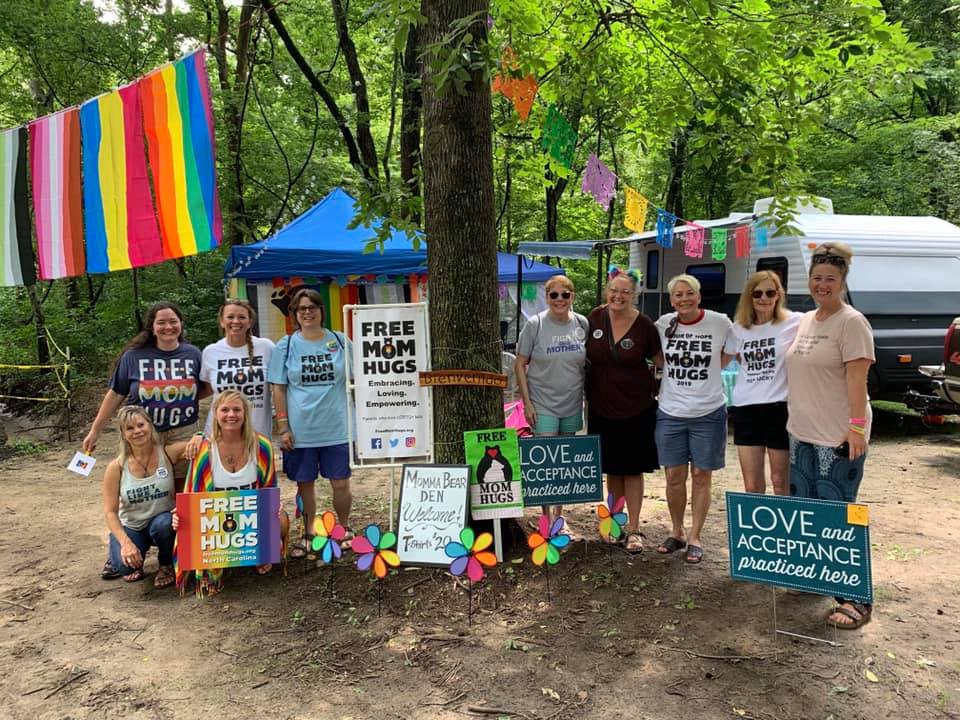
A group of mama bears and friends at Wild Goose Festival, a four-day spirit, justice, music, and arts festival in North Carolina, 2019. Image courtesy Liz Dyer.
In conservative Christian communities throughout the country, mothers of LGBTQ+ children are choosing to accept and affirm their children despite potential rejection from their churches and broader religious communities for doing so. Calling themselves “mama bears” for the ferocity with which they protect their children, these mothers come together online and in real life to share resources and support each other through the work of understanding and accepting sexualities and gender identities they previously held as wrong or sacrilegious. A Blade of Grass Fellow and filmmaker Daresha Kyi is creating the feature-length documentary film Mama Bears about and in collaboration with this community. In partnership with affirming pastors and churches; and religious, LGBT, and civil rights organizations, Kyi and various mothers are crafting a unique outreach plan to bring the film and mama bears face to face with churches and congregations wrestling with “the LGBTQ question,” to share their powerful testimonies.
A Blade of Grass Editorial and Communications Manager Emma Colón spoke with one of Kyi’s collaborators, Liz Dyer, a Texas-based mama bear and founder of the online community Serendipitydodah for Moms—a private Facebook group with over 7,000 international members. Liz shared the ways she and other mama bears in the community use their faith to affirm their children, and create a productive space to call into question commonly held beliefs in the Christian community.
This interview has been edited and condensed.
Emma Colón (EC): You founded the Serendipitydodah for Moms group in 2014. What was going on for you at the time you created the group? What led you to create this online space?
Liz Dyer (LD): Well, my son came out in 2007, and through the connections I made as I was trying to figure that out for myself, other people started sending parents of kids that were coming out to me. So I started a blog initially, because I thought it’d be nice to have a central place where I could share some resources; a place anyone could go and read.
Then in 2013, somebody invited me to a Facebook group for parents of LGBT kids. I liked the group, but the people who started it were much newer on the journey than I was. Throughout the six years of my own journey towards affirmation, I’d met a lot of people that were very involved in LGBT advocacy, and a lot of progressive Christians that were very committed to including LGBT people fully in the church. And so it made me think, I’ve got a lot to offer, but I don’t want to overstep and become a central figure in this other person’s Facebook group. So I thought, why don’t I make my own?
So in 2014 I started my group. I wanted it to be a group that any mother of an LGBT kid could join, as long as they were open to learning and growing. I started with a base foundation that I ask all members to agree with. There are three parts.
The first is that people don’t choose their sexual orientation or gender identity. This can be a little confusing to people. What I’m trying to say is that sexual orientation and gender identity are innate. It may take us a while to discover it sometimes, but it’s something we’re created with—not something we can manipulate and change.
The second is that you can’t change your sexual orientation or gender identity. Those two things are just because it’s innate.
And last, we’re adamant that conversion therapy in any form is damaging. Some people think it’s okay to pray for their kids to change, but we consider even that a form of conversion therapy. You don’t have to be electrically shocking somebody for it to be damaging.
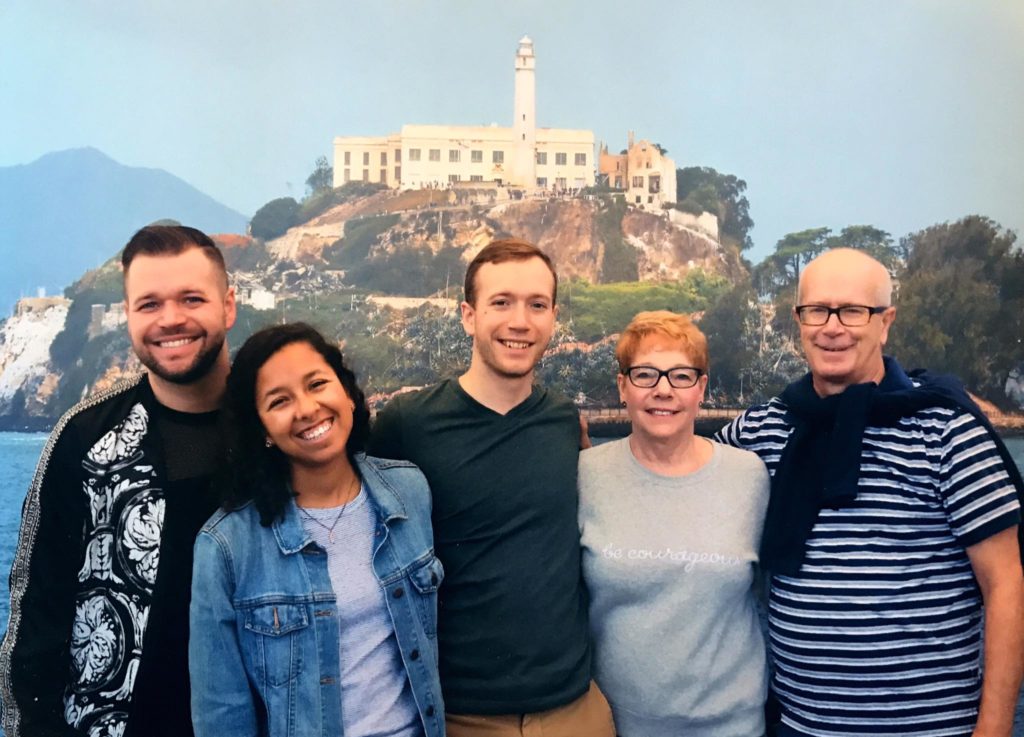
Liz Dyer (second from right) with her family in San Francisco.
EC: So it sounds like a summary of these three ground rules is that they’re about truly accepting.
LD: It’s really about understanding that this is the way an LGBT person is created. I personally don’t want parents to just accept their kids, I want them to be passionate about their kids living wholeheartedly into the people they were created to be. I think it’s very hard for parents to be fully supportive of their LGBT kids if they see them as broken and needing to be fixed. So I want us to start past that line.
If people [requesting to join the group] aren’t on board with the framework, I’ll allow them in the group, but if they need to discuss these fundamental guidelines we discuss it privately, outside of the group.
EC: So it’s more than acceptance—it’s about understanding, accepting, and also going beyond that to celebrate and affirm.
LD: That’s the purpose. Not everybody’s going to be at that point when they join the group, but it is amazing to watch people join the group and witness other mothers who are at this point of celebrating their LGBT kids—it’s like it gives them permission to do the same. It’s really exciting to see that happen.
EC: Related to that, what do you think is leading people to seek out the group? You have over 7,000 members—how do you think people are hearing about it, and what do you think is motivating them to come?
LD: One thing I did from the very beginning is I tried to set a very positive tone. Every June since 2014, we do a month-long “Pride and Joy” where I invite members of the group to post pictures of their LGBT kids and talk about them and why they’re proud of them; why they bring them joy. So I think that kind of positive environment for a mother who often feels like she has to hide that she has an LGBT kid is in itself a kind of contagious experience.
At the same time, there’s a little controversy sometimes because some members think I shouldn’t allow any politics in the group, since that’s not always a positive experience. I disagree, and we’ve always allowed politics in the group because I don’t want moms with their heads in the sand about things that really affect their kids. Politics have a big impact on LGBTQ people. The three main purposes of my group are supporting, educating, and empowering mothers of LGBT kids. So under education, we have to include what’s going on politically, because that’s the world that our kids live in. That’s the world we’re trying to change. I live in Texas. My son could be fired for being gay in this state. That’s a political issue; that’s not going to change until legislation changes. And legislation’s not going to change outside of politics.
If non-affirming people understand and connect with families like mine, some might change.
EC: You mentioned that you have the sense that members are seeking out the group because they feel in their lives offline like they’re having to hide their experience being parents of LGBTQ kids. Could you go into that a little bit?
LD: Right. I have a lot of members say in the group, “This is the only place I can share this”—it may be something about their LGBT kid that made them proud; anything—because they fear if they share it in their real life, or even online where their real life, friends may see it, that they’ll get criticized. I think actually most moms are not afraid that someone’s going to criticize them, but that someone might criticize their kid. There are just a lot of dynamics that make parents of LGBT kids feel like they have to hide [their experience]. And because this issue is kind of a hot political button, sometimes people just feel like they don’t know what others’ responses will be.
EC: At what point did you meet Daresha?
LD: Daresha was interested in the stories of mothers of LGBT kids who were coming from conservative Christian backgrounds and changing their minds to become affirming and to support and celebrate their kids. So she contacted me in April 2017. I told her at that time that the real story that was happening in our group was that these moms were becoming such passionate advocates. They’re writing books, they’re getting involved politically, they’re starting gay-straight alliances at the schools in their neighborhoods, they’re starting PFLAG chapters. And I told her there was one woman who was getting ready to do something very unique. That was Sara Cunningham, who was getting ready to do her first Free Mom Hugs Tour. Sara got this idea to go from Oklahoma to New York City, to arrive in New York at the Stonewall Memorial for Mothers’ Day and to stop at some cities along the way, encouraging parents and community leaders to be supportive of LGBT people. Daresha was living in New York at the time, and it ended up being the first thing she filmed.
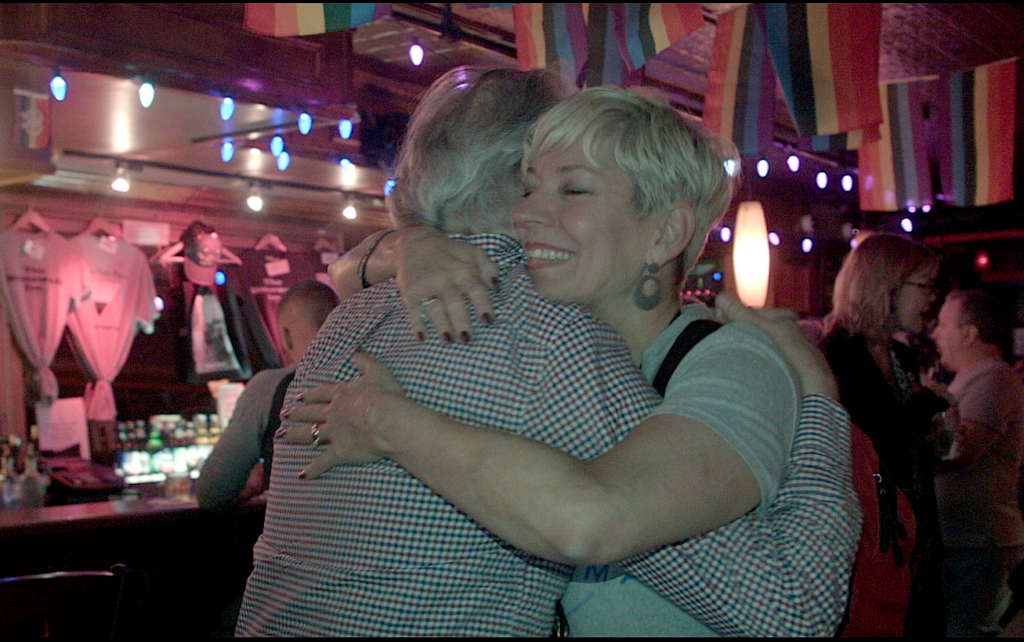
Sara Cunningham gives out free hugs at Stonewall Inn at the end of the first Free Mom Hugs Tour, photo courtesy Daresha Kyi.
EC: What was it about participating in Daresha’s film and the conversations it aims to have that made you interested in being part of it? Had you always been interested in a direct dialogue with churches and religious leaders and communities [in addition to supporting other mama bears]?
LD: My motivation to share my story was that I believe stories are powerful and help us understand and connect with one another. If non-affirming people understand and connect with families like mine, some might change.
Many families like mine who came from conservative Christian backgrounds have left the church because our LGBT kids were not fully included. Our kids are marginalized in those churches, and many times when we [as parents] come out as affirming, we are marginalized also. My dream was that moms like myself would come together and wholeheartedly support and celebrate our LGBTQ kids and become advocates for them—and part of that advocacy work is confronting harmful anti-LGBT theology that leads to marginalization both inside and outside the church.
As a Christian, I’ve always been interested in helping the church in general become fully affirming. I guess there are three main reasons I want the church to change: so Christian parents will be free and empowered as Christians to fully affirm their LGBT kids, so LGBT people and those who affirm them will be fully included in the church, and because I think churches impact society in general.
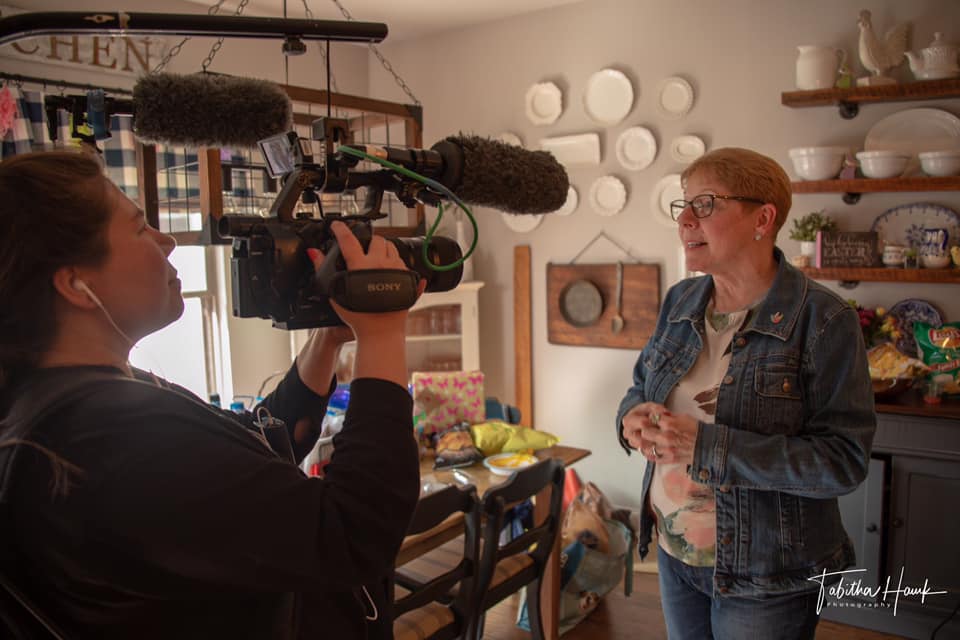
Liz is interviewed at a mama bear gathering in Nashville, Tennessee for the Mama Bears documentary, 2019. Photo by Tabitha Hawk, courtesy Liz Dyer
EC: Do you feel that it’s common for mama bears who are getting the resources, support, and tools they need inside the group to spread that information and empowerment in their own communities offline?
LD: One thing we always say is that a lot of times when our kids come out, we go in the closet. So then we as parents have to have our own coming out process to try to figure this out. A lot of fear that parents feel in the beginning is a fear of the unknown: what does this mean for my kid? How is this going to turn out? What does this mean for how I deal with my faith, or my beliefs, or my family, or my community? All kinds of questions. This is a very common part of the journey. But then as time goes on, you gain more confidence. And as these parents come out, they usually start sharing their story. They learn what they want to do and what works well for them. And as they see others in the group sticking up for their kids, it makes them think, you know, I want to do that for my kid. And then often it goes beyond that: not just wanting to stick up for your own kid, but wanting to stick up for the community.
Mama Bears to the Rescue is a subgroup I formed for moms who wanted to do that. Moms can respond to submissions to a form where an LGBT person fills out information about their situation. Most of the time it’s small acts of kindness—meeting someone for coffee, sending them a card in the mail, talking to them on the phone. In the first year of the group we’ve responded to over 100 requests.
EC: A big piece of Daresha’s project is bringing these stories to religious communities and to people who are maybe at the very beginning of their journey, grappling with how to accept their children or others in their life. If you had to identify a “starter pack” of resources for someone who’s at the very beginning or coming at this from a conservative or religious place, what are the first things you would say or resources you would share, specifically to folks who are overcoming the extra challenge of wading through their religion’s connection to all of this?
LD: We have collected a tremendous list of resources over the years. Most of them have been recommended by mothers of LGBT kids and they include a lot of things that are really good for people at the beginning of the journey. Personally, I always like to ask people a little bit about where they’re at so I can understand what resources would work best for them. For people coming from conservative Christian backgrounds, I think two things are really powerful. One, a good story: a good, personal, real-life story that they can read and relate to. One that I like to recommend is a memoir called Torn: Rescuing the Gospel from the Gays-vs.-Christians Debate, by Justin Lee.
And then the other thing is that conservative Christians are really concerned about what the Bible says. This was part of my own journey—I led women’s ministry, I wrote Bible studies and taught Bible studies, so I was very concerned about what the Bible said when my son came out. He basically said “I’ve been dealing with this for a long time secretly, I’ve thought and prayed about it and talked to people, and I’ve come to the conclusion that it’s not wrong.” I thought I was going to go to the Bible and actually prove to him that he was wrong. But when I went to scripture, that’s not what I found. I couldn’t find anything that talked about the kind of relationship my son wanted to have. There’s nothing in scripture that talks about it being wrong for someone to find someone else of the same sex, date them, fall in love, get married, have a family. Nothing. All the verses in the Bible that mention same sex relationships have to do with teaching a lesson about lust or prostitution. One of my favorite resources on this is from a booklet called The Clobber Verses by Janet Edmonds. If somebody wants a longer read, two books I would recommend are God and the Gay Christian by Matthew Vines and Unclobber by Colby Martin.
It’s so damaging for people to try not to live who they are. And to tell someone they can’t be who they are, that they need to change it when they can’t, is a shame-based message. Shame and secrets are so damaging to people. And that’s why I want parents to really celebrate their kids. LGBT people still have to go out into the world and face all kinds of obstacles and negative messages. But we know that if LGBT people have a meaningful relationship with even one person in their life who really celebrates them, encourages them, and believes in them, it can totally change that person’s life.
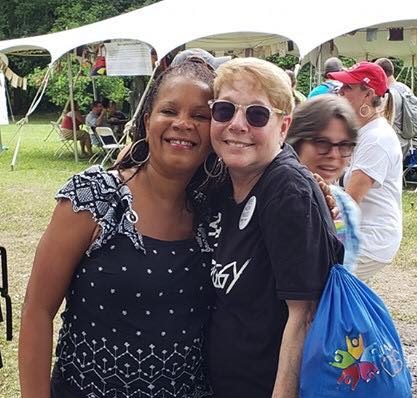
Daresha Kyi (L) and Liz Dyer (R) at Wild Goose Festival in North Carolina, 2019
Liz Dyer, founder of the Mama Bears, is married, has two sons, and lives in Fort Worth, Texas. In 2014, Liz had a dream that she could create a private Facebook group to support, educate and empower moms of LGBTQ kids, and that the moms who joined would help make the world a kinder, safer, more loving place for all LGBTQ people to live. Today that dream is coming true. Over the years, more than 7,000 moms have joined the group, and it has grown into a whole network of groups, projects, resources and websites that support moms of LGBTQ kids and the LGBTQ community. For more info about the Mama Bears, email Liz at lizdyer55@gmail.com.